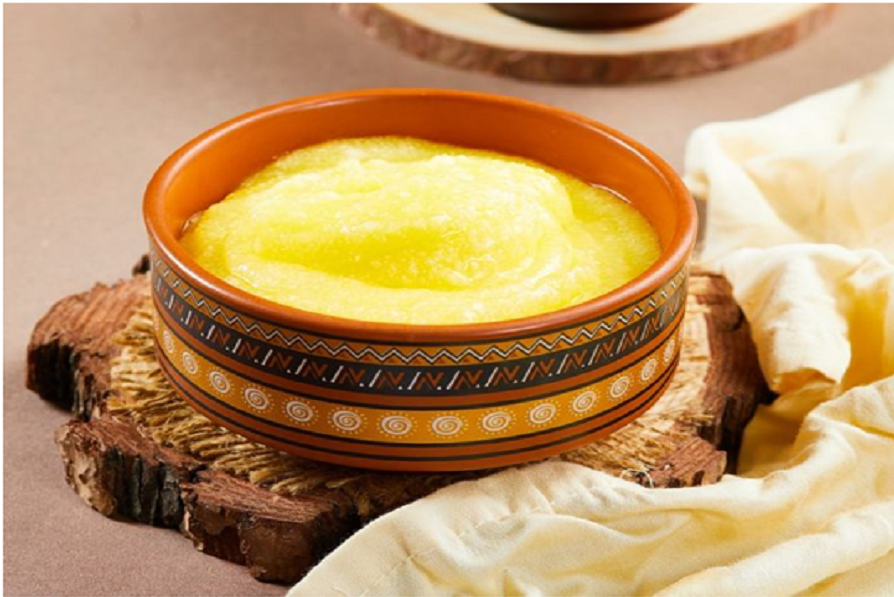Health Benefits of Ayurvedic Ghee

Health Benefits of Ayurvedic Ghee
Ghee is made for us.
What does that mean? It means you, us, and everyone in between are capable of being at their healthiest when they’re using Ghee.
Ayurveda is the ancient science of living well. And according to Ayurvedic principles, Ghee is one of the ways to achieve optimum health. Why? Because it’s clarified butter that’s been churned until its proteins break down into amino acids, vitamins, and minerals. It is made by boiling butter until all the water evaporates and the milk solids separate. The remaining oil is then cooled, strained, and placed in a jar that can be sealed tightly.
Ayurveda considers ghee to be very healthy for human consumption. Ayurveda states that ghee can balance all three doshas (constitutions) and help improve memory, intelligence, and strength. Ghee is also believed to increase life span by keeping us mentally alert throughout our lives.
Benefits of Ghee
Ghee, an Indian cooking ingredient, is considered one of all foods’ most healthy and nutritious. It has been used since ancient times in India as a fat to cook with and as medicine to cure ailments.
Good for digestive issues & constipation
Ghee is very high in butyrate—a type of short-chain fatty acid that dissolves mucus and prevents intestinal infections. It also is very effective in treating constipation—and as a result, it can be used to help treat a variety of digestive issues.
Ghee is free from lactose and casein and has a low glycemic index, making it an ideal kind of fat for people suffering from digestive issues. It’s believed that ghee stimulates the gallbladder to release bile, which helps break down fats. Furthermore, it melts at body temperature and does not solidify into crystals as other fats do, so it’s easier to digest.
The anti-inflammatory properties of ghee help to restore the natural balance of bacteria in the gut and improve digestion.
Ghee for nourished skin
Making ghee is especially suited to Ayurvedic skincare and detoxification. Ghee can be a potent anti-inflammatory, containing naturally occurring butyric acid and palmitoleic acid. This makes it great for all skin types, including those with sensitive skin, as it helps to bring down inflammation in the skin cells.
Ghee is a natural moisturizer and can be used for skincare. It provides ample amounts of butyric acid, an emollient, and can help hydrate your skin.
Ghee is full of vitamins A and E, which help fight free radicals that damage the skin and contribute to wrinkles. Ghee is also higher in omega-3 fatty acids than butter—and, therefore, may help fight acne and psoriasis. It gives the skin a buttery feel while penetrating deep into pores to unclog them.
Ghee for healthy hair
Ghee contains ceramides and other lipids that are great for moisturizing and nourishing the scalp. Ghee will not make your scalp greasy or oily like every other conditioner! It is rich in nutrients and vitamins and can be used as an excellent conditioner to maintain the health of your hair. It is rich in Vitamin A, which helps repair damaged hair cells and promotes sebum production, which keeps your scalp healthy.
Because the cows are pasture-raised instead of feed corn and soybeans, their ghee contains higher levels of omega 3s, which are essential for hair growth. It provides the hair with essential fatty acids that are great at hydrating, softening, and rejuvenating your locks. It provides nutrients to your hair follicles, which can help them grow thicker and more robust. And as ghee penetrates deep into the cuticle of each strand of hair.
Ghee also contains antioxidants, which can help fight free radicals and infections on your scalp. These antioxidants may also help promote new hair growth. Another benefit of using ghee on your hair is that it may help prevent breakage and split ends. Since ghee is rich in vitamin E, applying it to your hair will add moisture that could prevent breakage, especially if you tend to have dry or brittle hair.
Keeps heart healthy
You might think all the fat in ghee would put your heart at risk, but that isn’t true. The secret to ghee’s heart-healthy benefits is the type of fat it contains. Ghee contains primarily unsaturated fats, including oleic acid and stearic acid, considered much healthier than saturated fats. Research has found that replacing saturated fats with polyunsaturated or monounsaturated fats can significantly lower a person’s bad cholesterol.
It can also help lower bad cholesterol (LDL) and increase good cholesterol (HDL). It has also been shown to lower triglycerides, decreasing the risk of heart disease. Conjugated linoleic acid (CLA) is a fatty acid found in ghee that may help reduce body fat and prevent heart disease.
Ghee contains high omega-3 fatty acids, which help reduce inflammation and support heart health. Ghee also includes vitamin K2, which helps keep calcium out of your arteries and in your bones where it belongs.
Improves respiratory health
Firstly, if you suffer from a chronic respiratory condition such as asthma or COPD, butyric acid can help reduce the symptoms of your respiratory infection and promote overall health. When you inhale the rich, warm scent of ghee, your respiratory system is reinvigorated, which allows you to breathe easier and feel more relaxed.
Second, ghee’s high vitamin E content protects the lungs and helps them function properly. When people suffer from lung disease or injury, they often have difficulty breathing—which can cause serious health problems if left untreated. Ghee’s vitamin E content helps protect against this issue so that you can live more freely and easily.
Third, ghee promotes healthy cellular growth throughout the entire body—including the respiratory system! Ghee contains powerful antioxidants that fight off free radicals and keep your cells functioning properly. It can help strengthen your lungs and protect you from airborne diseases.
Boosts neurological system
For centuries, ghee has been used in the Ayurvedic medicine system to treat neurological disorders like Parkinson’s and Alzheimer’s. It can boost memory while slowing down mental degeneration associated with normal aging.
With a high concentration of essential nutrients, antioxidants, and fatty acids, ghee supports healthy cognitive function and overall nervous system health. Ghee also helps keep your arteries clear, preventing stroke and other neurological problems caused by poor circulation. The antioxidants found in ghee—including vitamin E, vitamin A, and selenium—can help protect your brain cells from the damage caused by free radicals and help keep your neurons working optimally.
It’s bursting with Omega 3 fatty acids, which help promote healthy brain function and reduce inflammation. Ghee also helps fight depression because it contains butyrate, boosting serotonin levels. Higher serotonin levels lead to less stress and an improved sense of joy and well-being!
Additional studies have found that ghee can also reduce anxiety, depression and stress by boosting gamma-aminobutyric acid (GABA). GABA is a neurotransmitter that can help calm the nervous system.
In summary, ghee is a flavorful, fat-rich condiment that can be used for more purposes than you might have initially thought. Ghee doesn’t just taste great – it’s good for you. So the next time you open up that bottle of ghee and notice those flakes of milk solids settling to the bottom, remember all the different ways this product will benefit your health. Think of it as the gateway drug to a healthier lifestyle.




